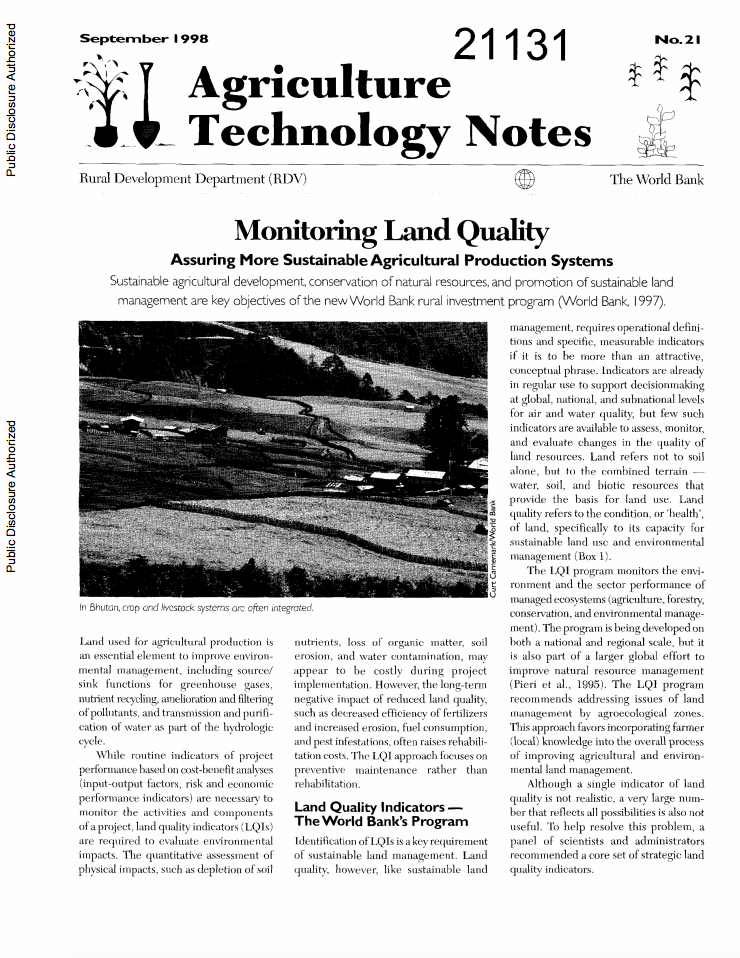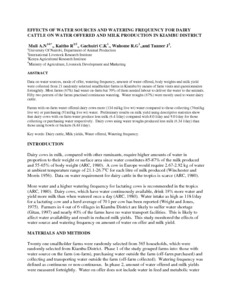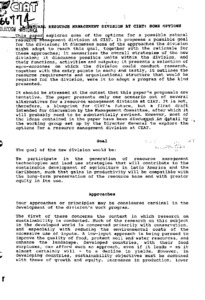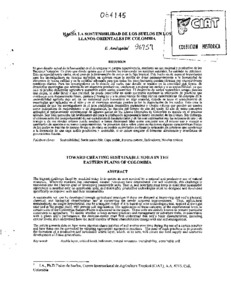LEGAL RECOGNITION OF INDIGENOUS GROUPS
...The main purpose of this paper is to examine legal measures taken to recognize
indigenous groups and provide for their ongoing operation; the paper starts, therefore, from an
underlying assumption that indigenous groups have continued relevance to the needs and wishes
of the people who operate within them. Nevertheless, while it is beyond the scope and purpose of
the paper to explore this complex issue in any depth, it may be useful to present – however briefly
– some of the arguments made for and against the preservation of indigenous groups. In the
Monitoring land quality : assuring more sustainable agricultural production systems
Identification of Land Quality Indicators (LQIs) is a key requirement of sustainable land management. They are required to assess, monitor, and evaluate changes in the quality of land resources and environmental impacts. The Land Quality Indicator (LQI) program monitors the environment and the sector performance of managed ecosystems. The program is being developed on a national and regional scale, but it is also part of a larger global effort to improve natural resource management. The LQI program recommends addressing issues of land management by agroecological zones.
Effects of water sources and watering frequency for dairy cattle on water offered and milk production in Kiambu District
Data on water sources, mode of offer, watering frequency, amount of water offered, body weights and milk yield were collected from 21 randomly selected smallholder farms in Kiambu by means of farm visits and questionnaires fortnightly. Most farms (67%) had water on-farm but 76% of them needed labour to deliver the water to the animals. Fifty two percent of the farms practised continuous watering. Water troughs (67%) were mostly used to water dairy cattle.
Land Tenure and Food Security: a review of concepts, evidence and measures
This paper attempts to build on a conceptual analysis of both land tenure and food security to set these various linkages that in a dynamic framework that captures both the effects of access to resources on food security and the effects of food security on access to and use of resources.
Land tenure and management of trees
Customary land areas in Western Ghana have been evolving towards individualized ownership. Inherited and temporarily allocated family lands are being transferred to wives and children as inter-vivos gifts, to be planted with cocoa. Giving gifts is a way to circumvent the traditional Akan matrilineal land inheritance system in which land is transferred from a deceased man to his matrilineal relatives but not to his wife and children.
A landscape that unites: community-led management of andean watershed resources
Beyond the farm and within the community: issues of collective action in participatory natural resource management research
Community-led Management of watershed resources in Hillside Agro-Ecosystems of Latin America: Annual Highlights for Project PE-3 October 1997
Farmer participatory research: measuring impact
The major issues in impact assessment for farmer participatory research (FPR) are analyzed. There are many potential ways in which FPR can have an impact; for example, increasing agricultural productivity, improving the management of natural resources or leading to a wider dissemination of innovations. FPR may also be more effective in reaching specific target groups, and it many reduce research costs and develop community capacity. Impact will be measured by different groups, and for different reasons, according to the circumstances.








